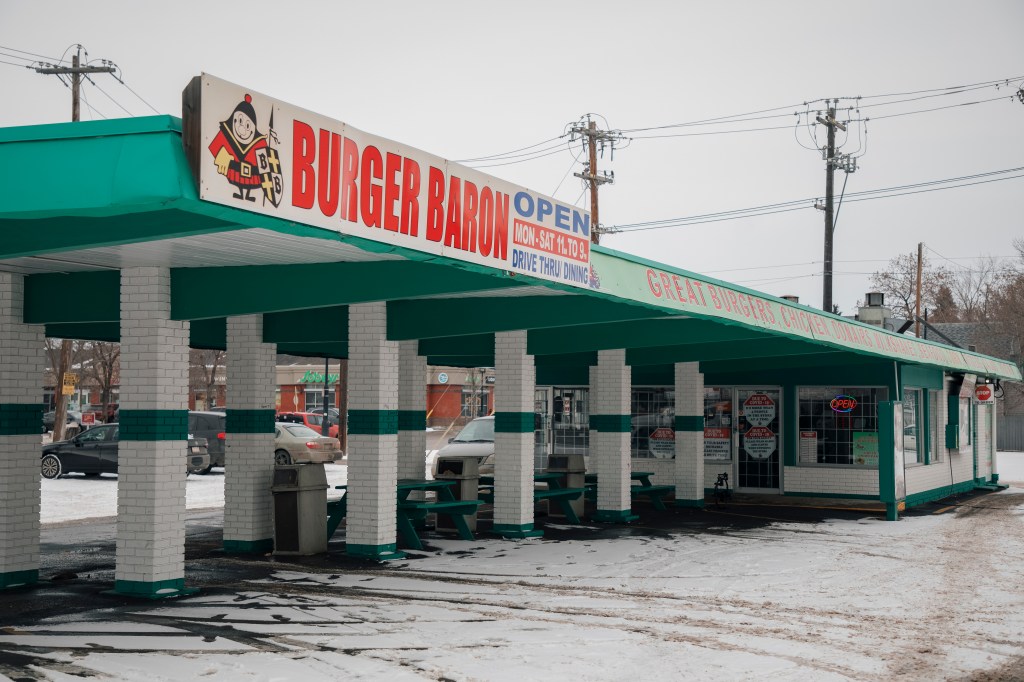Editor’s note: The Last Baron debuts on CBC Gem on Sept. 17. It will be shown on CBC-TV in Alberta and B.C. at 7 p.m. on Sept. 18. If you want to support the filmmakers, they are currently crowdfunding to help finance a feature-length version of The Last Baron. Photos in this story courtesy of Amber Bracken/Back Road Productions, unless otherwise noted.
Written by: Jared Majeski, Historic Resources Management Branch
Spend enough time driving down the highways and range roads in Alberta, chances are you’ll pass an old grain elevator. Hulking wooden structures stretching to the sky, weathered by decades of neglect. These prairie cathedrals are a ubiquitous tribute to how things used to work, before the inevitable march of technology pushed them aside. Drive down those same roads, through the villages and towns dotting Alberta, and you’ll find another symbol of how things used to work. This time, in the form of a structure you or I may take for granted: the humble diner. Specifically, the once-omnipresent eatery of so many small Alberta towns. Before Alberta had McDonald’s, it had the Burger Baron.
Premiering this Friday on CBC Gem is The Last Baron, a uniquely Albertan documentary about the history of the Burger Baron. Written, directed and co-produced by local writer and filmmaker Omar Mouallem, The Last Baron tells the story of how a community of Lebanese immigrants, through ownership of Burger Baron franchises across Alberta, supported their families, friends and communities by slinging fries, burgers and shakes to hungry Albertans. The film touches on the murky history of the original Burger Baron intellectual property, relationships between franchisees and the future of the Burger Baron business model.
Mouallem is also in an ideal position to tell this story: his family opened a Burger Baron restaurant in High Prairie in 1987. He remembers: “Originally, my dad planned on calling it Prairie Pizza. It wasn’t the plan to call it a Burger Baron. It was a last minute idea suggested to my Dad by his uncle in Slave Lake, who also owned a burger Baron. He said, ‘Look, you’re on Main Street. You’re on a main highway, and the main street of town. Burger Baron is a good name. It has done great things for us. You should just go ahead and use it to.’ And he did.”
When it comes to those in small towns and villages, historical information and demographics about the Lebanese community specifically can be tricky to find. What is known, however, references Lebanese immigrants in and around Edmonton. Several Lebanese-owned businesses in Strathcona were established prior to the Great War. The first was a general/dry goods store established by the brothers Ali and Mahmoud Tarrabain, which occupied four locations in southeast Strathcona between 1906 and 1923. One of these locations, which housed the business between 1910 and 1914, is still standing. The store served the Strathcona area but was also connected to a hinterland that stretched deep into northern Alberta. Richard Asmet Awid was the son of Ahmed Awid, an immigrant from present-day Lebanon who arrived in Canada in 1901. According to Awid, Ali tended the store in Strathcona while Mahmoud travelled north and sold goods in Conklin, Janvier and Fort McMurray.

Among his research on the history of Burger Baron, Mouallem scanned thousands of newspaper clippings from papers across Alberta. Interestingly, it was the classifieds sections that ended up producing some of the most interesting facts.
“Through the classifieds,” Mouallem said, “I was able to find the exact date that burger Baron as a company began and started hiring. I was able to find what when the mushroom burger was invented. I was also able to sort of see the sort of resurgence of Burger Baron after the Lebanese Civil War because suddenly there were jobs for hire, there were Burger Barons advertising promotions, and the classified sections was where that story was really playing out.”
To tell the story of the Burger Baron is to tell the stories of a generation of Lebanese immigrants who came to Alberta fleeing a civil war. While not every former owner of a Burger Baron franchise came to Alberta this way, a large number did. It’s a familiar story told a thousand different ways: living in a new country as a visible minority, working around the clock to support your family and working to gain the acceptance of your new community.
“The older generation of Lebanese immigrants, they really came for economic opportunity,” Mouallem mentioned. “And they largely have their heads down focused on that. I think that they don’t want to admit that they were ever feeling unwelcome. Part of that, I think, is just a need to express gratitude. Largely because they were, you know, workaholics trying to run a family business. A family restaurant is inherently an act of workaholism.”
Mouallem’s team includes award-winning executive producer Blake McWilliam, director of photography Moh Mahfouz and camera operator/sound recordist Mazen Mahfouz. Through interviews, animations and casual conversations with families over dinner, The Last Baron has style and high production value that wouldn’t look out of place on any of your favourite streaming services.
“Going into it I knew that I wanted to make something that was more cinematic than your average TV documentary. So the first thing that I re-watched was Ugly Delicious by David Chang. It’s about the more humble cuisine that we eat, things like tacos and kebabs, pizza and kids food. And it’s just kind of down to earth conversations with the people who make and eat food. The host, David Chang, is a great personality to watch, and he’s ever present and he never feels like an interviewer. He always feels like a conversationalist.” Chang’s Ugly Delicious directly influenced some scenes in The Last Baron, including a shot of burgers laid out on a Persian rug.
Despite the quirkiness of the subject, Mouallem said he still wanted to make something that took the food and the people who make the food seriously. He pointed to well-known documentaries like Jiro Dreams of Sushi and more under-the-radar films like The Donut King as further inspiration for The Last Baron. “We actually found out about this movie after [our film] was greenlighted,” remembers Mouallem. “And then when I watched it, I was like, ‘Oh my God’, this is the American version of The Last Baron.” The parallels between Mouallem’s documentary and The Donut King, a story of how Cambodian immigrants came to dominate California’s donut industry, are undeniable.
After growing up in a family who owned a Burger Baron, and after years of writing, research and production of the Burger Baron story here in Alberta, how has Mouallem’s taste in food developed?
“My mom, despite working full time all the time, still managed to put Lebanese food on the dinner table at least half the time. And for a kid like me my whole thinking was why would I want to eat that when I can have pizza, burgers and chicken fingers all the time. And so I resisted a lot of extremely delicious food in order to eat greasy food. But after moving out and moving out of High Prairie and going off to college that started to reverse where I built a taste for cuisine, and in part Lebanese cuisine. And so nowadays, I don’t really eat a lot of fast food at all. I but I love Lebanese food and will take up any invitation to eat at my parents’ house anytime.”
Sources:
Richard Asmet Awid, Through the Eyes of the Son: A Factual History About Canadian Arabs (2000)
The Edmonton Journal
CBC Edmonton




Really looking forward to this one!